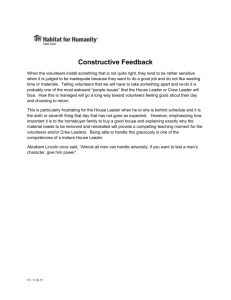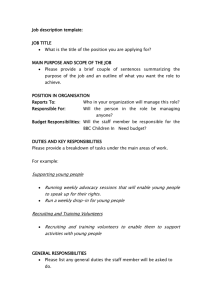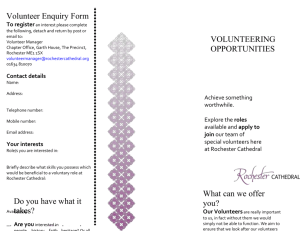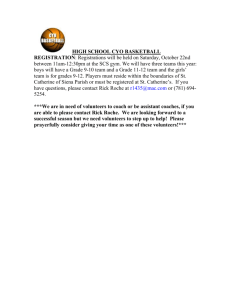Community Tool Box - Measuring Success Consortium
advertisement
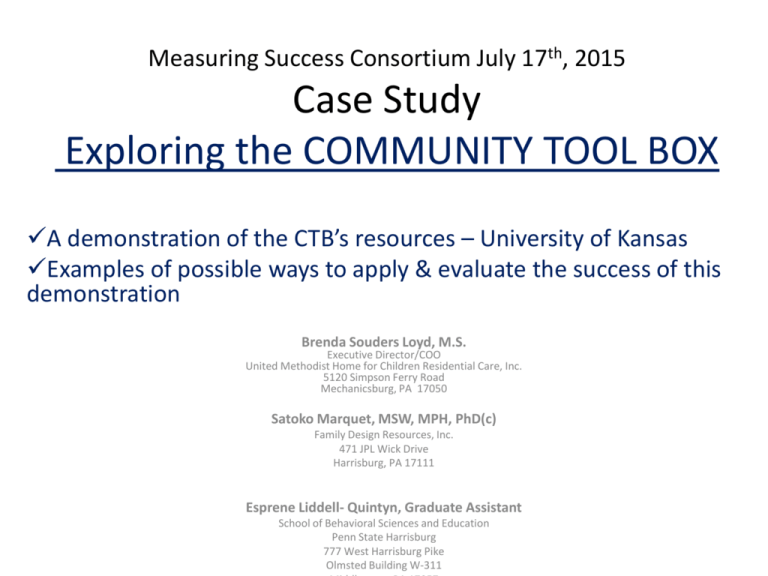
Measuring Success Consortium July 17th, 2015 Case Study Exploring the COMMUNITY TOOL BOX A demonstration of the CTB’s resources – University of Kansas Examples of possible ways to apply & evaluate the success of this demonstration Brenda Souders Loyd, M.S. Executive Director/COO United Methodist Home for Children Residential Care, Inc. 5120 Simpson Ferry Road Mechanicsburg, PA 17050 Satoko Marquet, MSW, MPH, PhD(c) Family Design Resources, Inc. 471 JPL Wick Drive Harrisburg, PA 17111 Esprene Liddell- Quintyn, Graduate Assistant School of Behavioral Sciences and Education Penn State Harrisburg 777 West Harrisburg Pike Olmsted Building W-311 Our purpose today Gain knowledge about the University of Kansas’ Community Tool Box website and resources. We will… • Locate and access the Univ of Kansas’ CBT website and its contents (an overview). • Identify how to access the following CBT Recruiting and Training Volunteers topics: Developing a Plan for Involving Volunteers Recruiting Volunteers Developing Volunteer Orientation Programs Developing Training Programs for Volunteers Community Tool Box www.ctb.ku.edu Community Tool Box Tools to change our world Free on-line resource for those people working to build healthier communities and bring about social change. Community Tool Box Resources for: assessment planning intervention evaluation advocacy Community Tool Box Vision People are better prepared to work together to change conditions that affect their lives. Mission To promote community health and development by connecting people, ideas, and resources. Community Tool Box CTB is a public service of the Work Group for Community Health and Development at the University of Kansas. Established in 1994 and continuously updated. Available in English, Spanish, and Arabic. Over 300 educational modules, free tools, and thousands of pages of tips. Community Tool Box Learn A Skill > how-to information Help Taking Action > guidance for your work Connect > link with others About > information about the tool box Services > connecting collective impact Learn A Skill Table of Contents 46 chapters of information related to community-building skills Includes curriculum guides, power point presentations, toolkits (quick start on core competencies in community work) Search Search feature is located in the right hand corner of each page. Helps to find specific information using key words. Help Taking Action Troubleshooting Guide – identifies common problems faced by people doing community work. Getting Started – simple model for taking action. Databases of Best Practices – for community health and development. Help Taking Action Online Courses – to learn about health assessment and community health improvement planning. Advisor – obtain guidance from experienced community members and experts related to your community work. Demonstration of the Toolbox Chapter 11: Recruiting and Training Volunteers Section 1: Developing a Plan for Involving Volunteers Section 2: Recruiting Volunteers Section 3: Developing Volunteer Orientation Programs Section 4: Developing Training Programs for Volunteers Community Tool Box www.ctb.ku.edu Learn a skill>Table of Contents> Chapter 11 Recruiting and Training Volunteers Section 4 Developing Training Programs for Volunteers Section 4 Power Point Presentation Developing Training Programs for Volunteers Toolkit Icebreaker Activity to use with volunteers during first training session. Lesson plan format to develop teaching activities with volunteers. Volunteer evaluation form. Community Tool Box Work Group for Community Health Development University of Kansas www.ctb.ku.edu Hmm…how might this be used? Application Imagine that your organization is tasked with developing a training program for volunteers. First, decide what you want the volunteers to gain during the training program (e.g. how to care for the elderly.) From this, you can create an objective for the training program. At the end of the volunteer program you will administer an evaluation form to assess how much/ what the volunteers have learned. Training areas may include: Policy Knowledge or Skills Application, etc. These are Evaluation areas too! Using a Likert scale you can measure your indicators of your training outcomes. NEXT: create graphs that illustrate the program's success. Let’s evaluate what we did – EXAMPLE How would you rate your knowledge level before and after the presentation? Our stated outcome: Gain knowledge about the University of Kansas’ Community Tool Box website and resources. Our scale to measure your knowledge level: • 1=no knowledge • 2=low level of knowledge • 3=medium level of knowledge • 4=high level of knowledge See HANDOUT questionnaire…YOUR COMMENTS/IDEAS welcomed!
